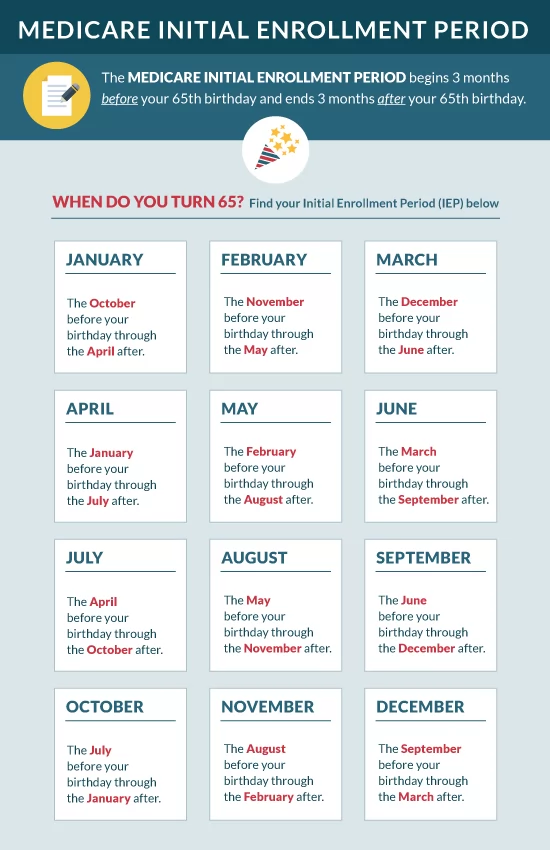Your Medicare Initial Enrollment Period is a once-in-a-lifetime event you can’t miss. Well, technically, you can – but if you do, there will be consequences.
Failing to enroll in Medicare during your Initial Enrollment Period can result in a huge hassle, a ton of paperwork, lots of stress, and late enrollment penalties.
So it’s essential to know when your Medicare Initial Enrollment Period is, what you need to do to enroll, and what your options are for delaying enrollment without getting penalized.
Calculating Your Medicare Initial Enrollment Period
One of the reasons beneficiaries often miss out on their Initial Enrollment Period is because they don’t know how to figure out when it’s. They assume it happens at the same time every year, just like many other enrollment periods associated with Medicare. But that’s not true.
Here’s how to figure out when your Initial Enrollment Period starts and ends so that you don’t miss out on your health care coverage.
Start with the month in which you will turn 65. Now, count back three months. Next, count the three months after your birth month. Your IEP begins three months before your 65th birthday and continues the month of and three months after.
That gives you a 7-month window to get your paperwork together, figure out what type of health coverage is best for you, and enroll in that plan as soon as possible.
This isn’t just for Part A & Part B but also applies to Medicare Part D, your prescription drug plan. There are late enrollment penalties for Medicare Part D and Original Medicare.
Lastly, your Medicare Initial Enrollment Period for Original Medicare and Medicare Part C (Medicare Advantage) will differ. This enrollment period is called the Medicare Advantage Initial Coverage Election Period (ICEP).
Missing Your Medicare Initial Enrollment Period
If you do happen to miss your Initial Enrollment Period, don’t worry. It’s not the end of the world. You will have a second chance to enroll during the General Enrollment Period.
It starts every year on January 1 and continues through March 31. Unfortunately, even if you enroll during these dates, your Medicare coverage will not begin until July 1.
That’s why it’s essential to pay attention and make sure you enroll on time – if not, you can go several months without any coverage and have to pay 100% out of pocket in a health emergency.
Some Beneficiaries May Be Eligible for Automatic Enrollment
There are some circumstances in which beneficiaries may get automatically enrolled in Medicare without going the extra mile and doing it themselves. This automatic enrollment will still happen during your IEP, but it won’t require any action on your part.
If you’re currently receiving Social Security benefits, your local Centers for Medicare & Medicaid Services office will mail you your Medicare packet – which includes your Medicare card – within the three months before your 65th birthday.
Social Security disability and Railroad Retirement Board disability work in a similar capacity. If you’ve been receiving benefits for at least 24 months before your 65th birthday, you will receive your Medicare packet in the mail either during the first three months of your IEP or by your 25th month of collecting benefits, whichever comes first.
Enrolling Early Gives You Coverage More Quickly
The Centers for Medicare and Medicaid Services would like you to enroll earlier rather than later.
If you enroll within the first three months of your IEP, your coverage will start on the first day of the month of your birthday. But if you delay, you could have a lapse in coverage.
The general rule of thumb is the sooner you enroll, the sooner you get coverage. And that will help you avoid expensive coverage gaps.
FAQs
What is the initial Medicare enrollment period?
It’s the timeframe right around the time you turn 65 and can sign up for your Medicare benefits. It’s a 7-month period that begins three months before your 65th birthday and ends three months after the same birthday.
When should you apply for Medicare?
For most, anytime up to three months before your 65th birthday is when you should apply for Medicare. However, everyone’s situation is different.
Are you automatically enrolled in Medicare?
Some beneficiaries will be automatically enrolled in Medicare. You’ll be registered automatically if you’re already receiving Social Security or Railroad retirement benefits, become diagnosed with Amyotrophic Lateral Sclerosis, or if disabled once you reach your 25th month of disability benefits.
How to Get Help During your Medicare Initial Enrollment Period
If your IEP is approaching, or you’re in the middle of it, can we help? Our agents can help you navigate the different parts of Medicare and ensure you also enroll in the right supplemental plan for your healthcare needs.
If you’re already enrolled in Part A & B but still need supplemental coverage, call us. Or complete our rate form to get rates in your area.
